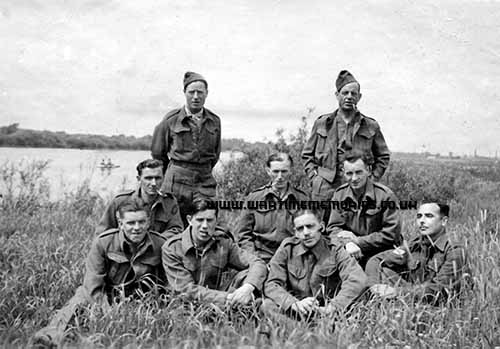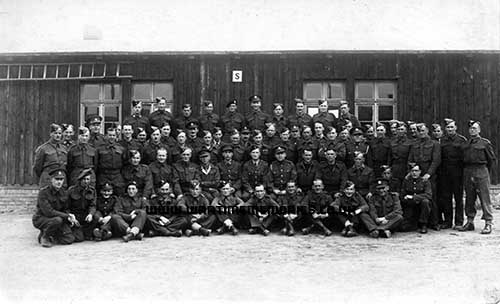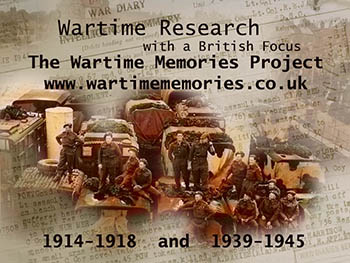|
|
|
210th Field Company, Royal Engineers
210th Field Company, Royal Engineers saw action in the Battle of France in 1940 as part of 44th Division. They went on to see action in North Africa.
28th May 1940 In Action 
30th May 1940 Machine Guns
26th Nov 1942 Reorganisation
If you can provide any additional information, especially on actions and locations at specific dates, please add it here.
|
|
|
The Wartime Memories Project is the original WW1 and WW2 commemoration website.
Announcements

- 1st of September 2024 marks 25 years since the launch of the Wartime Memories Project. Thanks to everyone who has supported us over this time.
- The Wartime Memories Project has been running for 25 years. If you would like to support us, a donation, no matter how small, would be much appreciated, annually we need to raise enough funds to pay for our web hosting and admin or this site will vanish from the web.
- 26th Mar 2025 - Please note we currently have a huge backlog of submitted material, our volunteers are working through this as quickly as possible and all names, stories and photos will be added to the site. If you have already submitted a story to the site and your UID reference number is higher than
265607 your information is still in the queue, please do not resubmit, we are working through them as quickly as possible.
- Looking for help with Family History Research?
Please read our Family History FAQs
- The free to access section of The Wartime Memories Project website is run by volunteers and funded by donations from our visitors. If the information here has been helpful or you have enjoyed reaching the stories please conside making a donation, no matter how small, would be much appreciated, annually we need to raise enough funds to pay for our web hosting or this site will vanish from the web.
If you enjoy this site
please consider making a donation.
Want to find out more about your relative's service? Want to know what life was like during the War? Our
Library contains an ever growing number diary entries, personal letters and other documents, most transcribed into plain text. |
|
Wanted: Digital copies of Group photographs, Scrapbooks, Autograph books, photo albums, newspaper clippings, letters, postcards and ephemera relating to WW2. We would like to obtain digital copies of any documents or photographs relating to WW2 you may have at home. If you have any unwanted
photographs, documents or items from the First or Second World War, please do not destroy them.
The Wartime Memories Project will give them a good home and ensure that they are used for educational purposes. Please get in touch for the postal address, do not sent them to our PO Box as packages are not accepted.
World War 1 One ww1 wwII second 1939 1945 battalion
Did you know? We also have a section on The Great War. and a
Timecapsule to preserve stories from other conflicts for future generations.
|
|
Want to know more about 210th Field Company, Royal Engineers? There are:435 items tagged 210th Field Company, Royal Engineers available in our Library There are:435 items tagged 210th Field Company, Royal Engineers available in our Library 
These include information on officers, regimental histories, letters, diary entries, personal accounts and information about actions during the Second World War. |
|
Spr. Leslie Herbert Mitchell 210th Field Coy. Royal Engineers   In 1936, Leslie Mitchell had joined the Territorial Army, and qualified as a Pioneer DIII. In August 1939, he was mustered as a Sapper, 210th Field Coy, Royal Engineers and was mobilised in Feb or Mar 1940 to go to France, where the Regiment was deployed building or destroying bridges, roadworks or railways.
They were usually in the midst of the fighting, so when the order came to evacuate the Army at Dunkirk in May/June 1940, the Engineers were the last to leave, having tried to destroy any access behind them. Les's group were ready to go, but some of their comrades were lagging behind, so they went back to help, but were all captured by the Germans on 27th of May at Fletre. Les recalls that “The Germans just came up like wheat in the field and the French, (who were acting as their escort and support), threw up their hands and surrendered”.
Les spent the duration of the War in Stalag VIIIb, later Stalag 344, near Lamsdorf in Silesia. Les said that Lamsdorf was a small town and being in the centre of a wheat growing area, had a flour mill. The prisoners were put to work cleaning and enlarging the canals which supplied water and transport to the mill.
The British prisoners also did the heavy work in the mines and road gangs, while the Italians and Poles worked on the farms. They all refused to do anything which would help the German war effort.
Les also said that the guards in the camp were German officers, but were older men, or men recovering from wounds, and on light duties before being returned to the Front, so though life in Stalag VIIIB/344 was tough, they managed fairly well, and the prisoners were also treated fairly well. They were able to strip ears of wheat as the passed the fields and smuggle it back to camp in the cuffs of their trousers, there to be made into porridge, a welcome supplement to camp food. Les took his turn at cooking for the men in his hut.
In 1945, as the Soviet armies resumed their offensive and advanced into Germany, Stalag 344 was evacuated on 22nd of January and the Soviet Army reached the camp on the 17th of March 1945.
Only once did Les mention, and very briefly, that he survived the Death March by eating what he could scrounge along the roadsides and at the overnight camps. He said that they "woke up one morning and the German guards had gone".
According to his service record, Les was liberated in Germany on 28th of April 1945. He was then repatriated to England, to return to a hero’s welcome at Newhaven, and received his demobilisation orders in February, 1946.
Les had married Win Novis in Newhaven in January 1940, and after the war worked as a dairyman on various farms in southern England for 10 years. With the Suez crisis looming and an offer from the Australian Government to attract English workers, he migrated to Australia in 1956 with Win and his young family.
For three years he worked in Brisbane, Queensland, then in 1959 he joined the Australian Army, but was retrenched in 1961 in Wallangarra, a small town on the border of New South Wales and Queensland, and the main Ammunition Depot for the Army.
He moved the family to Wallangarra and obtained a job at the local meatworks for a few months until he was offered a job as Steward at the Sergeant’s Mess. He worked there for about twenty years, when he was transferred to the Officer's Mess. After only a few months, he retired in March, 1983.
|
Recomended Reading.Available at discounted prices.
|
|
|







